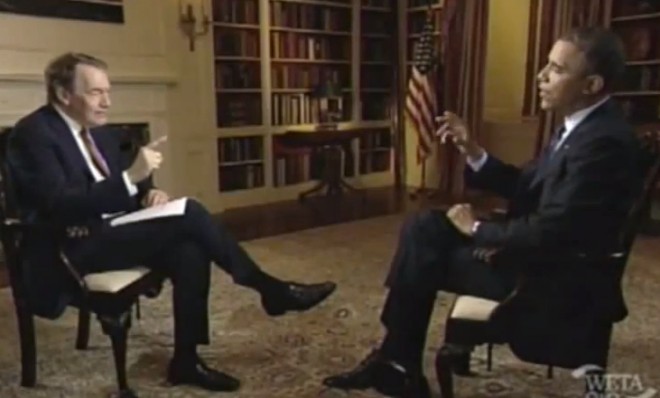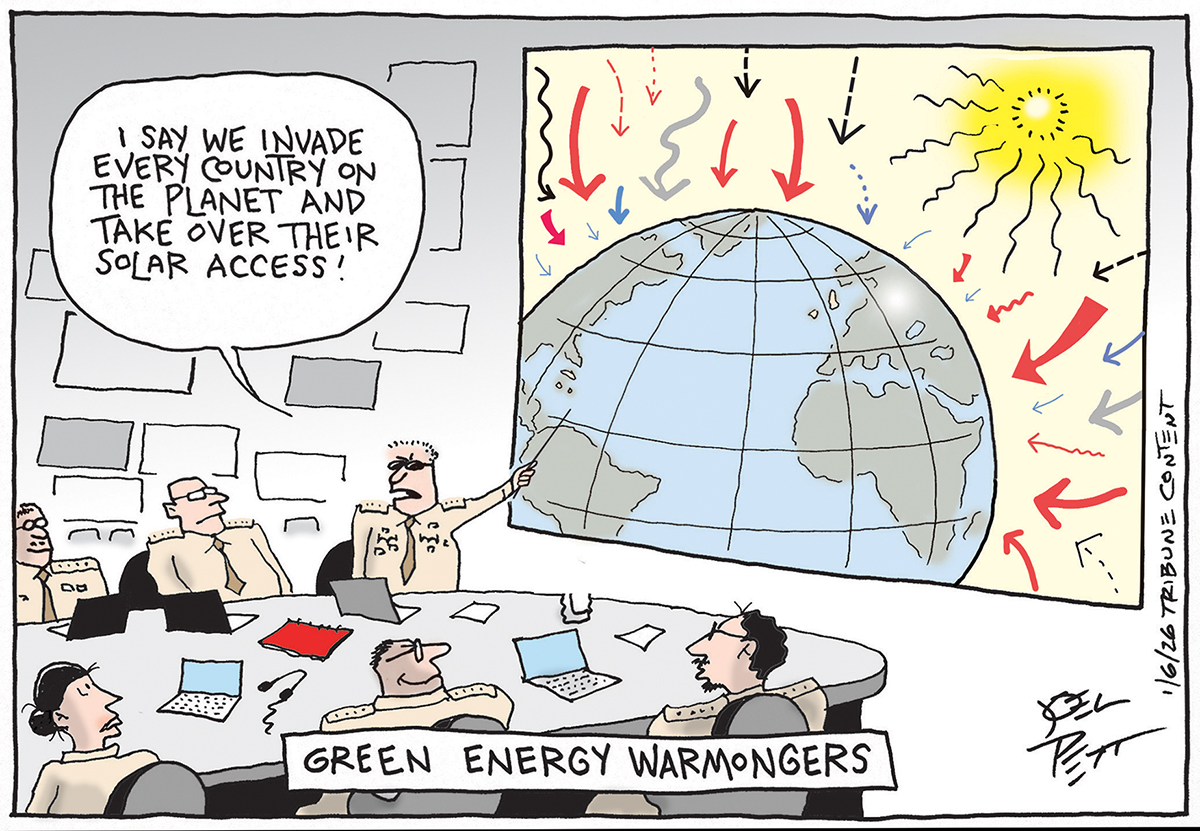5 takeaways from Obama's sit-down with Charlie Rose
The president talked national security, Syria, and Dick Cheney in his 45 minutes with the PBS host


National Security Agency leaker Edward Snowden spent an hour online on Monday morning explaining his rationale for unveiling government secrets and elaborating on his understanding of how NSA eavesdropping works. On Monday night, it was President Obama's turn, as PBS aired a 45-minute interview conducted by Charlie Rose on Sunday.
Obama and Rose covered a handful of topics, from the war in Syria to Federal Reserve Chairman Ben Bernanke's future (Obama hinted that Bernanke doesn't want another term). But the most-anticipated (and most-discussed) part of the interview was Obama's defense of the NSA surveillance programs (watch above). Here's a look at that segment, plus other highlights from the interview:
1. The president says NSA spying is 'transparent'
The Week
Escape your echo chamber. Get the facts behind the news, plus analysis from multiple perspectives.

Sign up for The Week's Free Newsletters
From our morning news briefing to a weekly Good News Newsletter, get the best of The Week delivered directly to your inbox.
From our morning news briefing to a weekly Good News Newsletter, get the best of The Week delivered directly to your inbox.
Obama told Rose that the NSA surveillance programs are legal and "transparent," because they are overseen by the Foreign Intelligence Surveillance Act courts and Congress. That definition of transparency raised some eyebrows, and even prompted a little sass from the normally staid Associated Press.
Obama called the programs "transparent — even though they are authorized in secret," says the AP's Kimberly Dozier. The president did add that he has "set up a privacy and civil liberties oversight board made up of independent citizens, including some fierce civil libertarians," to help foster "a national conversation, not only about these two programs, but also the general problem of data, big data sets, because this is not going to be restricted to government entities." But again, Dozier says, that discussion "is complicated by the secrecy surrounding the FISA court, with hearings held at undisclosed locations and with only government lawyers present. The orders that result are all highly classified."
Obama added that the NSA programs are governed by strong checks and balances, but acknowledged that the public has no way of knowing if they're working. Along with setting up the civilian oversight board, Obama said he's also asking the intelligence community to declassify as much as it can without endangering national security. Obama continued:
What I can say unequivocally is that if you are a U.S. person, the NSA cannot listen to your telephone calls, and the NSA cannot target your emails... and have not. They cannot and have not, by law and by rule, and unless they — and usually it wouldn't be 'they,' it'd be the FBI — go to a court, and obtain a warrant, and seek probable cause, the same way it's always been....
We're going to have to find ways where the public has an assurance that there are checks and balances in place... that their phone calls aren't being listened into; their text messages aren't being monitored, their emails are not being read by some Big Brother somewhere.
Obama, too, worried about the programs as a senator and presidential candidate, but insists that seeing them in action, and tinkering with their legal oversight, has "put him at ease," says Brian Resnick at National Journal.
A free daily email with the biggest news stories of the day – and the best features from TheWeek.com
But here's the problem with selling these programs to those who mistrust them: The average citizen can't go through that same process the president did. Despite the leaks, there's not much public transparency with the programs. Companies involved are ordered not to talk, proceedings in the Foreign Intelligence Surveillance Court are secret, and lawmakers have only just begun explaining to the press how they've overseen the process....
For some, this answer will be enough. For others, it will never be because the argument is reduced to "if you trust the system, you should trust the NSA." And American trust of public institutions is as low as it has ever been. [National Journal]
2. He insists that he's not Dick Cheney
Rose asked Obama to respond to criticism that his administration is "Bush-Cheney lite." And respond he did. "I think it's fair to say that there are going to be folks on the Left" criticizing me, Obama said. "And what amuses me is now folks on the Right who are fine when there's a Republican president, but now, Obama's coming in with the black helicopters." Then he got in a much-quoted riff on Cheney:
Some people say, "Well, you know, Obama was this raving liberal before. Now he's, you know, Dick Cheney." Dick Cheney sometimes says, "Yeah, you know? He took it all lock, stock, and barrel." My concern has always been not that we shouldn't do intelligence gathering to prevent terrorism, but rather are we setting up a system of checks and balances.
3. Syria is a mess with no easy answer
Obama acknowledged that he's ramping up military aid to the struggling rebels in Syria, but argued with Rose's assertion that this is a new policy. Instead, Obama said, the goal is still a prosperous, legitimate, representative Syrian government achieved through political means, but President Bashar al-Assad's use of chemical weapons triggered the prewarned military aid. Obama also said that a stable Syria is in U.S. strategic interests, and dismissed accusations that he was too slow to arm the rebels.
This argument that somehow we had gone in earlier or heavier in some fashion, that the tragedy and chaos taking place in Syria wouldn't be taking place, I think is wrong.... The fact of the matter is, the way these situations get resolved is politically. And the people who are being suppressed inside of Syria who develop into a military opposition — these folks are carpenters and blacksmiths and dentists. These aren't professional fighters. The notion that there was some professional military inside of Syria for us to immediately support a year ago or two years ago [is wrong]....
And one of the challenges that we have is that some of the most effective fighters within the opposition have been those who frankly are not particularly [friendly] towards the United States of America, and arming them willy-nilly is not a good recipe for meeting American interests over the long term.
4. Iran's new president could pave the way for negotiations
When Rose asked about Iran's election over the weekend of moderate cleric Hassan Rowhani, Obama sounded pretty upbeat. "The Iranian people rebuffed the hard-liners and the clerics in the election who were counseling no compromise on anything anytime anywhere," he said. "Clearly you have a hunger within Iran to engage with the international community in a more positive way." Does that mean Rowhani is a leader we can do business with? Rose asked. Obama replied:
I do think that there's a possibility that they decide — the Iranians decide to take us up on our offer to engage in a more serious substantive way.... I think that my general view is, we are open to discussions — both through the P5+1 and through potential bilateral channels — and we recognize that you're not going to solve problems all up front, as a precondition for talks.
5. Criticism is a good thing for presidents to endure
Obama told Rose that there's another way he's different than George W. Bush: He embraces criticism. "I think this is a healthy thing, because it's a sign of maturity that this debate would not have been taking place five years ago. And I welcome it. I really do," Obama said:
It's useful to have a bunch of critics out there who are checking government power, who are making sure we're doing things right, so that if we've triple checked how we're operating any one of these programs, let's go quadruple check it. And I'm comfortable with that, and I'm glad to see that we are starting to do that.
Peter has worked as a news and culture writer and editor at The Week since the site's launch in 2008. He covers politics, world affairs, religion and cultural currents. His journalism career began as a copy editor at a financial newswire and has included editorial positions at The New York Times Magazine, Facts on File, and Oregon State University.
-
 ‘No Other Choice,’ ‘Dead Man’s Wire,’ and ‘Father Mother Sister Brother’
‘No Other Choice,’ ‘Dead Man’s Wire,’ and ‘Father Mother Sister Brother’Feature A victim of downsizing turns murderous, an angry Indiana man takes a lender hostage, and a portrait of family by way of three awkward gatherings
-
 Political cartoons for January 11
Political cartoons for January 11Cartoons Sunday’s political cartoons include green energy, a simple plan, and more
-
 The launch of the world’s first weight-loss pill
The launch of the world’s first weight-loss pillSpeed Read Novo Nordisk and Eli Lilly have been racing to release the first GLP-1 pill
-
 The billionaires’ wealth tax: a catastrophe for California?
The billionaires’ wealth tax: a catastrophe for California?Talking Point Peter Thiel and Larry Page preparing to change state residency
-
 Bari Weiss’ ‘60 Minutes’ scandal is about more than one report
Bari Weiss’ ‘60 Minutes’ scandal is about more than one reportIN THE SPOTLIGHT By blocking an approved segment on a controversial prison holding US deportees in El Salvador, the editor-in-chief of CBS News has become the main story
-
 Has Zohran Mamdani shown the Democrats how to win again?
Has Zohran Mamdani shown the Democrats how to win again?Today’s Big Question New York City mayoral election touted as victory for left-wing populists but moderate centrist wins elsewhere present more complex path for Democratic Party
-
 Millions turn out for anti-Trump ‘No Kings’ rallies
Millions turn out for anti-Trump ‘No Kings’ ralliesSpeed Read An estimated 7 million people participated, 2 million more than at the first ‘No Kings’ protest in June
-
 Ghislaine Maxwell: angling for a Trump pardon
Ghislaine Maxwell: angling for a Trump pardonTalking Point Convicted sex trafficker's testimony could shed new light on president's links to Jeffrey Epstein
-
 The last words and final moments of 40 presidents
The last words and final moments of 40 presidentsThe Explainer Some are eloquent quotes worthy of the holders of the highest office in the nation, and others... aren't
-
 The JFK files: the truth at last?
The JFK files: the truth at last?In The Spotlight More than 64,000 previously classified documents relating the 1963 assassination of John F. Kennedy have been released by the Trump administration
-
 'Seriously, not literally': how should the world take Donald Trump?
'Seriously, not literally': how should the world take Donald Trump?Today's big question White House rhetoric and reality look likely to become increasingly blurred
